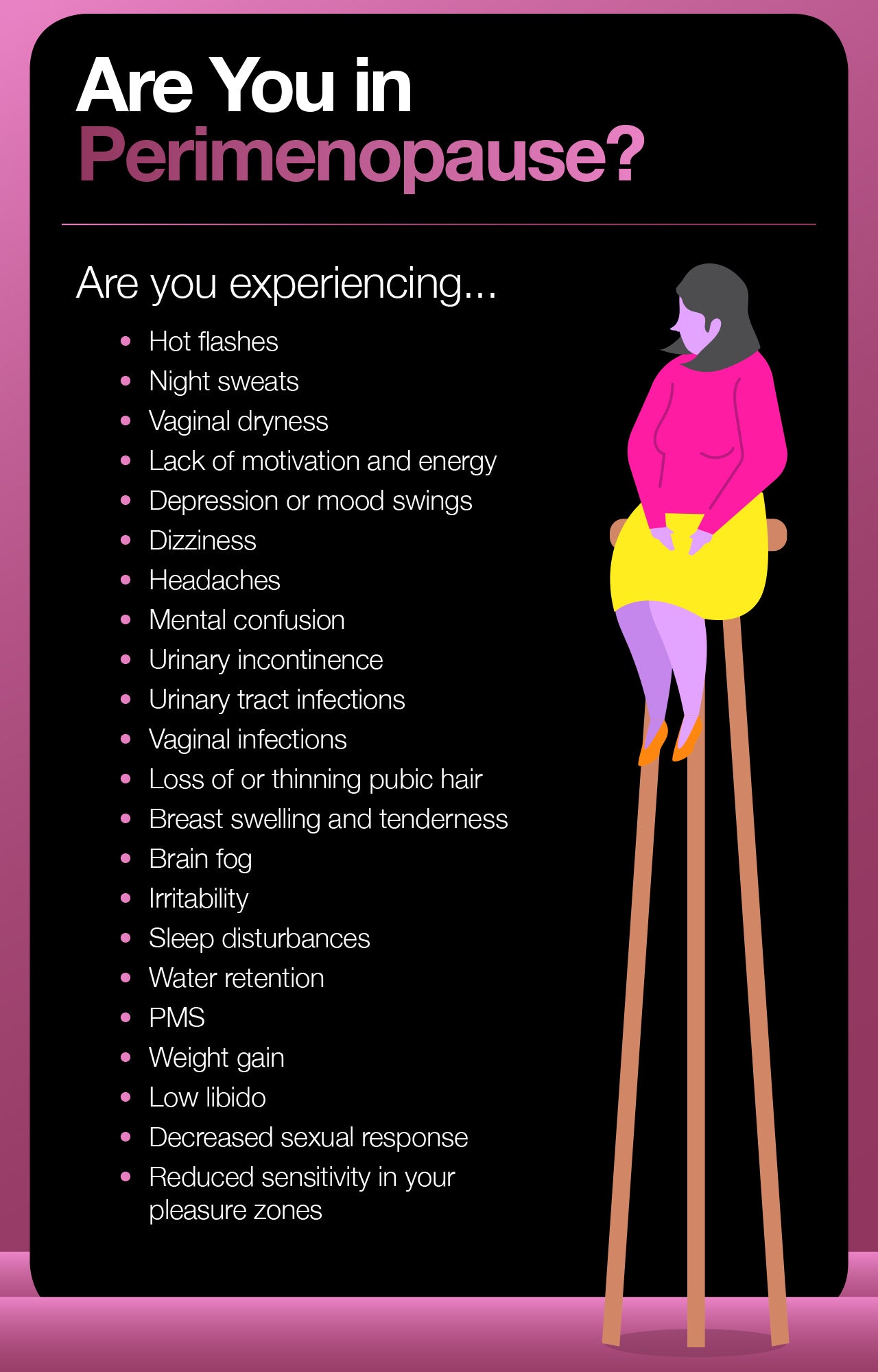Understanding Perimenopause: The Before, During And After
 By: by Amino Science
By: by Amino Science

Menopause is the time in a woman’s life when she stops menstruating and is no longer able to bear children. Doctors refer to perimenopause as the time in which a woman is transitioning into menopause. Women who notice symptoms of perimenopause may expect menopause to set in within a few years, but menopause onset can take as long as 10 years after perimenopause signs start to manifest.
Understand perimenopause and menopause symptoms before you enter this important stage of a woman’s life. Preparing for this inevitable phase may drastically alleviate the emotional and physical discomfort often associated with menopause transition. And throughout it all, please remember you aren't alone: approximately 40 million American women are likewise transitioning to menopause.
Premenopause vs. Perimenopause
Perimenopause signals the gradual decrease of the two main female sex hormones estrogen and progesterone. Ovaries, adrenal glands, fatty tissues, and the brain produce these hormones to regulate various functions of the female reproductive system, including menstrual cycles. As a woman ages and levels of estrogen decrease, follicle stimulating hormone (FSH) increases and ovarian egg quality diminishes along with fertility. You can, however, still get pregnant in the perimenopausal stage, so some form of birth control should still be used if a baby is not part of your life plan. Ultimately, the ovaries stop releasing eggs.
Premenopause describes the span of time between when a female begins menstruating, or menarche, until when she enters perimenopause or menopause—or the time between her first and last periods. Premenstrual syndrome (PMS) symptoms, such as irritability, cramps, bloating, breast tenderness, and nausea, are common during premenopause. Although sex hormone levels may fluctuate during premenopause, menstrual periods are usually regular or semi-regular, ovarian eggs are generally healthy, and fertility is most probable.
Menopause occurs when regular vaginal bleeding has ceased for 12 consecutive months. Menopause onset occurs between the ages of 49 and 52 for most women in Western societies, but onset can occur earlier or later.
Cholesterol levels tend to increase during the menopause transition. A 2011 study published in The Korean Journal of Internal Medicine recognized an increase in total and low-density lipoprotein (LDL) cholesterol levels in females transitioning from premenopause to postmenopause. After a woman has gone through menopause, she enters postmenopause, which lasts for the remainder of her life. FSH levels are highest during postmenopause. A doctor can administer urine and blood tests that measure hormone levels to determine your menopausal phase.

Perimenopause Symptoms
Perimenopausal woman may experience irregular periods that are heavier, lighter, shorter, or longer than is usual. Abnormal premenstrual symptoms may herald these changes.
Other signs of perimenopause often mirror menopausal symptoms and are primarily symptomatic of declining estrogen levels. Vasomotor symptoms (such as night sweats, hot flashes, and flushes) are common manifestations of menopause transition as well as the postmenopausal phase of a woman’s reproductive life.
Sometimes hormonal changes and mood changes can be very disruptive and compromise your daily activities and well-being. Typical perimenopause symptoms include:
- Irritability and mood swings: Psychological and emotional discomfort are common characteristics of hormone imbalance. Problems concentrating or maintaining consistent moods can worsen during perimenopause. Severe anxiety and depression can set in if these symptoms are not properly addressed. Pre-existing psychological disorders may require mental health intervention.
- Insomnia: Drops in estrogen levels can lead to feelings akin to chronic distress, and most women suffer sleep disturbances as a result. In addition to psychological disruptions, internal changes during perimenopause may trigger urinary urgency, feverishness, sweating, and chills—all symptoms that can lead to sleep disruption.
- Hot flashes: An increase of blood flow can trigger hot flashes—sensations of a sharp rise in body temperature—and profuse sweating. Hot flashes can last anywhere from 30 seconds to 10 minutes and often occur around the neck, face, and torso regions. A subsequent drop in body temperature can result in sudden chills.
- Night sweats: Hot flashes often occur at night during sleep. Sudden perspiration episodes significantly disturb sleep cycles and can induce anxiety or signs that mimic panic, such as heart palpitations. Males who share sleeping quarters with affected women may suffer the effects of insomnia as well as feelings of helplessness.
- Weight gain: Swelling along with breast tenderness is common, as is weight gain. If you haven't been much of an exerciser, then perimenopause is a great time to make lifestyle changes and engage in a form of exercise you enjoy.
- Other symptoms: Vulvovaginal atrophy results from decreased estrogenization of the vaginal tissue that can lead to inflammation and vaginal dryness—which, for some women, may cause soreness and pain during sex. Thinned, damaged vaginal tissue may heighten the occurrence of urinary frequency and pelvic organ prolapse, or bulging in the vagina due to a shifted bladder or uterus that drops down and presses against vaginal walls.
Early Menopause
Doctors commonly use the term premature menopause to describe menopause onset that occurs before the age of 40. There are known and unknown reasons why a woman may experience early menopause.
The age for menopause transition is dwindling in India—a country that has seen tremendous social and economic gains over the last few decades—but India’s fertility rates have plummeted. Some health experts believe that unprecedented stressors of a newly burgeoning economy, a fast-paced lifestyle, and changes in traditional dietary practices are several reasons why women in India are exhibiting untimely menopausal signs during normal reproductive years—sometimes as early as 29 years of age.
You will likely experience more acute perimenopausal symptoms if you undergo treatments that induce early menopause. Certain chemotherapy, radiation treatments, or other medications can lower estrogen levels. Synthetic phytoestrogens are known endocrine disruptors that compromise reproductive health, and cigarette smoking or long-term opioid use have been linked to early menopause. Primary ovarian insufficiency caused by poor genetics and autoimmune illnesses, like celiac disease, can also lead to advanced menopause transition; although premature, perimenopausal symptoms are usually normal in these instances. In rare cases, however, women bypass the perimenopause stage altogether, no longer have menstrual periods, and experience menopause symptoms indefinitely through postmenopause.
Menopause that is surgically induced by way of hysterectomies without the removal of ovaries preserves gradual perimenopause responses. Under these circumstances, even though you do not experience menstrual periods, your ovaries continue to produce sex hormones. However, the removal of both the uterus and the ovaries triggers an abrupt estrogenic drop, and menopause is either immediate at the time of removal or soon-to-occur after surgery.
Perimenopause Treatment
Don’t let perimenopause symptoms dishearten you, as there are many treatment options available. For some of these remedies time is of the essence, so understand your options early on and be mindful of any harmful side effects.
Every woman’s experience is different. A doctor will cater your treatment plan based on your specific needs. Your detailed observations of bodily changes, frequency of symptoms, or any abnormalities can help your medical team in this process and can subsequently enhance the effectiveness of your perimenopause treatment plan.
In addition to consulting your doctor for treatment, you may lessen the severity of perimenopause symptoms by heeding the following tips.
Smoking
Do not smoke. Smoking cigarettes increases the risk of heart disease and osteoporosis—known complications linked to menopause.
Hormone Replacement Therapy
Take hormone replacement therapy (HRT) medication to compensate for drops in estrogen. HRT is most effective in patch form, although estrogen therapy also comes in gels, creams, and pills. Women who experience debilitating vasomotor symptoms often find relief with hormone therapy. HRT is also known to impair the effects of low bone density, which can cause osteoporosis.
HRT’s health benefits notwithstanding, it is important not to take dosages above what is deemed effective for your specific health needs. Hormone therapy has been linked to uterine cancer and breast cancer. Other side effects may include blood clots, stroke, and heart attack.
Perimenopausal woman should remain particularly vigilant about HRT and possible implications for short-term or long-term use. The Women’s Health Initiative’s 2017 guidelines regarding hormone therapy assess the benefit-risk ratios for taking HRT in relation to age and menopausal phase. Women younger than 60 years old or who are within 10 years of menopause onset appear to have a more favorable treatment response than women 60 years or older who initiate HRT more than 10 or 20 years from menopause onset.
Exercise
Many women who begin menopause transition also begin a new and exhilarating fitness lifestyle. Some women who’d never go near a gym in their premenopausal days have entered and won bodybuilding competitions in their perimenopausal and menopausal, or even postmenopausal, days.
Harboring excess weight can aggravate perimenopause symptoms. Engaging in guided vigorous activity on a continual basis helps keep your zest for life high and your body fat low. If weightlifting is not your shtick, other weight-bearing exercises, like running, yoga, tai chi, and dancing, can be just as effective for tackling weight gain.
Support your weight-loss and exercise goals with a performance-enhancing essential amino acid supplement, proven to help build muscle mass and boost endurance. Learn more here.
Sex
Hormonal changes can subdue your sex drive, but menopausal transition can be a liberating time for a woman. Remedy the physiological perimenopausal impairments in order to enjoy a fulfilling sex life. Enjoyable sex can lower stress levels and fortify relational bonds with your mate. Done regularly, Kegel exercises can help strengthen vaginal muscle tissue. Water-based vaginal lubricants or local vaginal estrogen treatment can ease dryness symptoms.
Diet
Avoid spicy foods and hot beverages to ease or lessen the frequency of hot flashes. Low estrogen levels can lead to low bone density, so it is important to consume bone-nourishing nutrients like calcium, iron, phosphorus, and vitamin K. Spinach and other dark leafy green vegetables contain all of these nutrients in considerable dosages. Low estrogen is also attributable to accelerated cardiovascular illness. Consuming omega-3 fatty acids can help bolster blood circulation and heart muscle strength. Avoid foods high in saturated fats to help keep your LDL cholesterol low.
Stress
Excess stress often turns a good situation bad and a bad situation worse, so avoid or limit stressors whenever possible. Be prepared to embrace the fact that your body may be limited in what it can take on physically, as well as emotionally. This may mean that you need to set up social mechanisms, for example, to help mitigate your exertion levels as you age. The support networks—family, friends, church groups, volunteer organizations, etc.—you have cultivated through the years can be great sources of physical and emotional assistance, so communicate your needs and concerns with your growing inner circle of helpmates. Knowing that you have a trove of unconditional support at your disposal can help alleviate the psychological discomfort that can trigger vasomotor responses during menopause transition.



 833-264-6620
833-264-6620


















